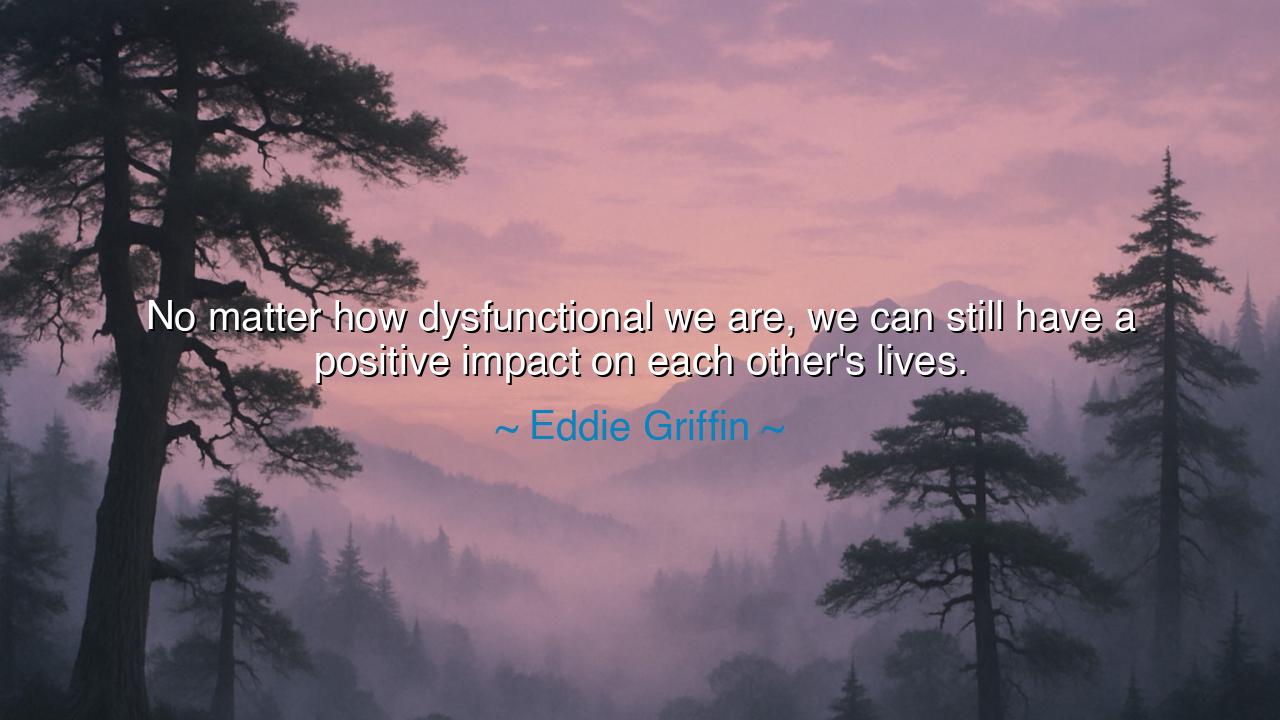
No matter how dysfunctional we are, we can still have a positive
No matter how dysfunctional we are, we can still have a positive impact on each other's lives.






Hear the voice of Eddie Griffin, who with humor and wisdom unveils a profound truth of the human condition: “No matter how dysfunctional we are, we can still have a positive impact on each other’s lives.” These words pierce through illusions of perfection and remind us that even in our brokenness, we carry the power to heal, uplift, and inspire. For who among us is without flaw? Yet our flaws do not erase our light; rather, they are the setting against which that light shines more clearly.
To be dysfunctional is simply to be human—to carry wounds, contradictions, and imperfections. Many believe such brokenness disqualifies them from goodness, but Griffin’s words remind us that even cracked vessels can carry water, and even wounded souls can become sources of hope. Indeed, it is often those who have suffered most who offer the deepest comfort, for they know the terrain of pain and can guide others through it. The positive impact we bring is not because we are perfect, but because we dare to share ourselves despite imperfection.
The ancients understood this paradox. In Japanese tradition, the art of kintsugi repairs broken pottery with gold, making the fractures part of the beauty. In the same way, our dysfunction becomes part of our story, and when we choose to live with courage, our scars become the very lines through which light flows. In the Christian scriptures, Paul the apostle declared, “My strength is made perfect in weakness.” Across cultures, the lesson repeats: wholeness is not the absence of cracks, but the willingness to shine through them.
History gives us luminous testimony. Consider Abraham Lincoln, plagued with melancholy and known for his inner torment. Yet from his struggles was born deep empathy, enabling him to guide a divided nation through its greatest trial. His dysfunction did not prevent him from greatness; rather, it gave him the humility and compassion to have a positive impact on millions. His story teaches us that pain and imperfection need not be barriers to service—they may instead be the very roots of our power.
Griffin’s words also challenge us to view others differently. Too often, we measure people by their flaws, dismissing their worth because they are dysfunctional in some way. Yet every soul, however broken, can bless another. A struggling parent can still inspire their child with love. A flawed leader can still set in motion acts of justice. A friend battling their own demons can still offer a word that saves us in our darkest hour. We must learn to see beyond the imperfection to the possibility of positive impact.
The lesson for us is clear: do not wait for perfection before you try to make a difference. If you wait until you are flawless, you will wait forever. Instead, act now, in your present condition, offering what light you have. Likewise, do not reject the help or inspiration of others simply because they are broken; remember that gold is mined from the earth, not from polished marble. Value the gifts of others, even when wrapped in imperfection.
Practical steps flow from this wisdom. Acknowledge your own dysfunction without shame, and ask how it might be transformed into service. Share your story honestly, for your scars may give courage to another. Offer kindness even on your worst days, for even small acts ripple into eternity. Surround yourself with those who, though imperfect, still strive to bring positive energy, and encourage them in turn.
So remember Griffin’s counsel: “No matter how dysfunctional we are, we can still have a positive impact on each other’s lives.” These words are a balm for the weary and a call to action for the hesitant. Walk boldly in your imperfection, and use it as fuel to love, to serve, and to inspire. For the measure of a life is not flawlessness, but the light it leaves behind in the hearts of others.






NTHien Nguyen Thi
I appreciate the hopeful perspective in this quote, but it makes me wonder about societal perceptions of dysfunction. How does the context—family, workplace, or community—affect the ability to contribute positively? Can recognition of our own imperfections lead to greater humility and effectiveness in relationships? I’d like to discuss ways to embrace our flaws while still consciously fostering positive outcomes for those around us.
BNbao nguyen
This idea is inspiring, yet it raises a subtle question about limits. Are there situations where personal dysfunction might prevent someone from having a genuinely positive impact, or is there always potential for contribution? I’d like to explore whether intentionality, empathy, and self-reflection are the key factors in turning imperfections into strengths, and how people can cultivate these qualities to make a difference despite their shortcomings.
QCDoan Vu Quynh Chi
Reading this, I feel both comforted and curious. How do we ensure that our attempts to have a positive impact don’t unintentionally harm others due to our own dysfunction? I’d like to discuss strategies for self-awareness and accountability that allow people to leverage their strengths while minimizing negative effects. Can understanding and accepting our flaws actually enhance our ability to connect and positively influence others?
LVNguyen Long Vu
This quote makes me reflect on the complexity of human relationships. I wonder, how do we recognize our capacity to contribute positively despite our flaws or dysfunctions? Is it a matter of small gestures, or can even imperfect people create meaningful change in others’ lives? I’d like to explore real-life examples where people, despite their personal challenges, have profoundly impacted those around them in constructive ways.